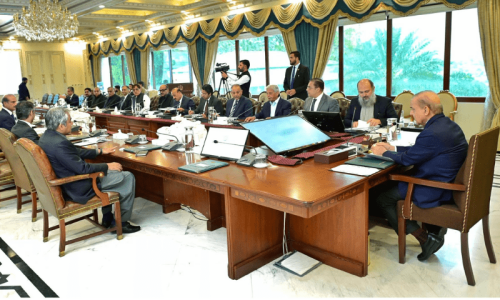LONDON, Aug 30: British Prime Minister David Cameron counted the cost on Friday after a humiliating rejection by parliament of his call for military action on Syria, a defeat which dealt a severe blow to the “special relationship” with the United States.
Mr Cameron suffered the worst setback of his three years in office when lawmakers he had recalled from their summer holidays voted 285 to 272 to defy the government’s motion late on Thursday.
It was a doubly damaging defeat for Mr Cameron, who had already watered down the original motion in response to demands from the Labour opposition.
The party said it needed “compelling evidence” that the Syrian regime had been responsible for a chemical attack that killed hundreds near Damascus, then said it was opposing the government’s “opaque” motion.
It is believed to be the first time since 1782 that a British government has lost a vote about military action.
A potentially damaging picture emerged of the government’s chaotic organisation of the vote, with some ministers failing to cast ballots because they did not hear the warning bell.
As tempers flared, Education Secretary Michael Gove screamed abuse at fellow Conservative MPs who had voted against their party’s coalition government.
Defence Minister Philip Hammond prompted fury among opposition ranks after he accused Labour leader Ed Miliband of providing “succour” to the regime of President Bashar al-Assad by opposing the government.
However, Mr Cameron is likely to bear most responsibility for the result.
He reportedly had pushed Barack Obama to take action over Syria, but now the US president is left to pursue a military option without his closest ally and the country that gave US forces the strongest backing in Iraq and Afghanistan.
Mr Cameron said he did not feel he should apologise to Mr Obama, and said he hoped the US leader would understand that he had had to seek parliament’s approval before action.
“I don’t think it’s a question of having to apologise,” he said.
Mr Cameron said he still wanted to see “a robust response” to chemical weapons use and suggested Britain would increase diplomatic pressure on the Syrian regime, but conceded it could not now take part in military strikes.
Veteran politician Paddy Ashdown, a former special forces soldier, said Britain’s standing in the world had been hugely diminished by the result.
“It has a profound implication for our country. I think it diminishes our country hugely,” the former Liberal Democrat leader said.
“We now have a bunch of people – the same ones who voted against this last night – who want to get out of Europe and have smashed our relationship with the United States,” he said, in a swipe at rebel Conservative backbenchers.
Earlier he wrote on Twitter: “In 50 years trying to serve my country I have never felt so depressed/ashamed.”
Prof Michael Clarke of the Royal United Services Institute think-tank said parliament’s decision would prove an embarrassment for Britain internationally, but it remained to be seen whether it would be merely a “blip” in relations with Washington.
He said that while Britain had a strong intelligence-sharing relationship with the US, the “symbolism” of the absence of UK forces in any military action over Syria would be strong.
Finance Minister George Osborne, considered the most powerful figure in the government after Prime Minister Cameron, acknowledged that Britain’s inability to commit forces to any US-led operation against the Assad regime would damage the so-called “special relationship” with Washington.
“I think there will be a national soul-searching about our role in the world and whether Britain wants to play a big part in upholding the international system,” Mr Osborne said.
“I understand the deep scepticism that many of my colleagues in parliament, many members of the public, have about British military involvement in Syria. I hope this doesn’t become a moment where we turn our back on all of the world’s problems.”—AFP















































Dear visitor, the comments section is undergoing an overhaul and will return soon.